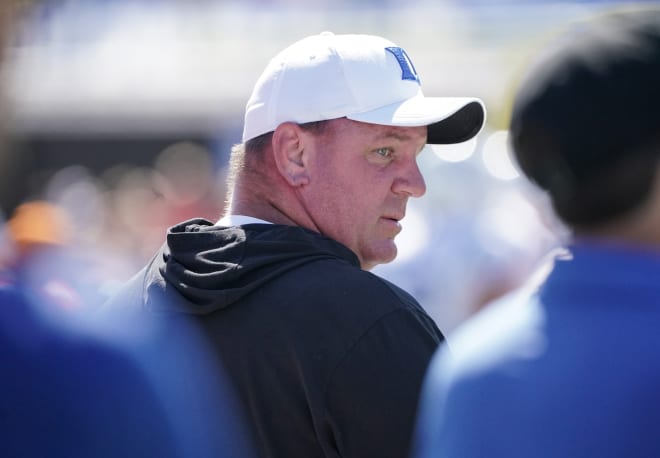OT penalty call remains baffling for Duke

DURHAM – First, you’ve got to establish what needs to be established: That Duke’s football team didn’t play well for three quarters of Saturday’s 23-20 overtime loss at Georgia Tech.
“I just felt like we consistently shot ourselves in the foot on both sides of the ball,” coach Mike Elko said on Monday.
And then you’ve also got to establish that cliché about officials not single-handily determining outcomes.
“I’ll just say this, obviously no game gets decided by the officials,” Elko said. “And we should never have put ourselves in that position.”
That position was an offensive pass interference call that nullified a 15-yard pass from Riley Leonard to Sahmir Hagans on Duke’s possession in overtime. Instead of first-and-goal at the 5-yard line, the Blue Devils were backed up with a third-and-20 from the 35.
An incompletion on the next play and Charlie Ham’s missed 52-yard field goal ended the game, placing the bitterness squarely on the pass interference call.
Elko declined comment on the play after Saturday’s game, noting he needed to watch the film.
On Monday, he wasn’t as fired up as he was during the game – but you didn’t need a psychology degree to know that it was still bothering him.
“In 23 years of coaching, it’s the first time I’ve ever seen an OPI on that play, so,” Elko said, trailing off.
Hagans is straddling the line of scrimmage when he makes the catch – his right foot is on the 20-yard line, which was the line, and his left foot is at about the 19. He’d first gone downfield at the snap, but backtracked for a screen.
As he’s going up for a catch, wide receiver Jontavis Robertson engages in a block on the cornerback who started the play across from Hagans. That’s who the offensive pass interference call was made against. Hagans cuts between blockers and gets to the 5-yard line, more than enough yards to convert the third-and-5.
The NCAA’s rulebook defines offensive pass interference as “contact by a Team A player beyond the neutral zone that interferes with a Team B player during a legal forward pass play in which the forward passes crosses the neutral zone.”
Those last nine words are the key.
Hagans is behind the line when the ball is thrown. He is right at the neutral zone when he secures the catch.
There’s never a single play that wins or loses a football – or any sport, for that matter – game by itself. Hypotheticals always exist before and almost always after crucial plays.
It’s hard to ignore the hypothetical difference of whether the offensive pass interference call was made or not against Georgia Tech.
